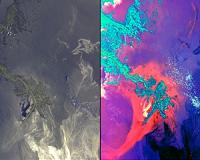 |
Tel Aviv, Israel (UPI) Jun 16, 2010 Israel's natural gas bonanza in the eastern Mediterranean just keep getting bigger, with reserves currently pegged at around 25 trillion cubic feet. That's enough to guarantee the Jewish state, dependent on imported energy since it was founded in 1948, energy security for at least two decades. The strikes at three fields, dubbed Tamar, Dalat and Leviathan, could even turn Israel into a gas exporter and transform its economy. There are indications that there's oil down there as well. But the offshore finds may become a casus belli as Lebanon, Israel's northern neighbor and longtime battleground, lays claim to the gas fields as well. Lebanon's As-Safir newspaper reported June 8 that the biggest field found off Israel, Leviathan, extends north into Lebanese waters and could well aggravate tensions between the countries. Under the headline "Israel prepares to steal gas fields in Lebanon's waters," the leftist daily said if Israel tried to siphon gas from Lebanese territory, Beirut would be forced to defend its resources. One of Hezbollah's top leaders, Hashem Safieddine, head of the Iranian-backed movement's executive council, has declared it won't allow Israel to "loot" Lebanese gas resources. Israel's military chiefs say Hezbollah currently possesses around 45,000 missiles and rockets, which could be fired at Israel's emerging energy infrastructure centered on the port of Haifa. The city was repeatedly hit by Hezbollah rockets during the 34-day war with Israel in July and August 2006. These days, Hezbollah purportedly has long-range weapons that have greater accuracy and carry more destructive warheads than those used in 2006. These are capable of hitting just about anywhere in Israel. In the event of renewed hostilities, and both sides are talking tough again, Israel's energy installations would be prime targets. Lebanon's parliament speaker, Hezbollah ally Nabih Berri, has urged the Beirut government to move swiftly to start its own offshore exploration or risk Israel claiming whatever resources there are. "Israel is racing to make the case a fait accompli and was quick to present itself as an oil emirate, ignoring the fact that, according to the maps, the deposits extend into Lebanese waters," said Berri. The speaker, who has submitted a parliamentary bill to launch exploration of Lebanon's potential offshore reserves, declared: "Lebanon must take immediate action to defend its financial, political, economic and sovereign rights." Israeli officials insist that the gas fields lie within Israeli territorial waters. However, the liberal Haaretz daily noted Tuesday, "Israel has yet to declare its exclusive economic zone, though this usually applies to what in the sea, such as fish, and not what lies under the continental shelf." It quoted Professor Moshe Hirsch of Jerusalem's Hebrew University, an expert in international law, as saying that problem could arise when the continental shelf is shared by more than one country. But he maintained the gas lies squarely in Israel's sector of the continental shelf and so there was no need top declare an exclusive economic zone. The first strikes were made early this year at the Dalit field off Hadera, south of Haifa by a consortium headed by Noble Energy, a U.S. company with headquarters in Houston, which is working with three Israeli firms. Tamar, 50 miles east of Haifa, was found in April. Last week Nobel raised its original estimate of the field's size by 33 percent to 8.4 trillion cubic feet of gas. But then came the discovery of Leviathan, double the size of Tamar at an estimated 16 trillion cubic feet of gas, further off the coast. Nobel said that total offshore reserves could top 30 trillion cubic feet, double Britain's giant gas fields in the North Sea, with a conservative value of some $300 billion. Nobel is moving a drilling platform from the Gulf of Mexico to step up exploration. Gas production is to begin in 2012. Israel is planning to build a liquefied natural gas plant near Haifa but it probably won't go online until 2015. The gas finds, particularly Leviathan, which may turn out to be even bigger, are "nothing short of a geopolitical gamechanger," Gal Luft, executive director of the U.S.-based Institute for the Analysis of Global Security, wrote in Haaretz Sunday. "Altogether the basin the eastern Mediterranean could contain an amount of gas equivalent to one-fifth of U.S. natural gas reserves."
Share This Article With Planet Earth
Related Links Powering The World in the 21st Century at Energy-Daily.com
 Obama warns of oil spill 'epidemic' in Oval Office address
Obama warns of oil spill 'epidemic' in Oval Office addressWashington (AFP) June 15, 2010 US President Barack Obama warned Americans Tuesday they faced a long battle against an "epidemic" of oil pollution in the Gulf of Mexico and called for a new "national mission" to wean the United States off fossil fuels. In his debut prime-time address from the Oval Office, Obama also vowed to do whatever was necessary to help the people of the southern US coast recover from the disaster and ... read more |
|
| The content herein, unless otherwise known to be public domain, are Copyright 1995-2010 - SpaceDaily. AFP and UPI Wire Stories are copyright Agence France-Presse and United Press International. ESA Portal Reports are copyright European Space Agency. All NASA sourced material is public domain. Additional copyrights may apply in whole or part to other bona fide parties. Advertising does not imply endorsement,agreement or approval of any opinions, statements or information provided by SpaceDaily on any Web page published or hosted by SpaceDaily. Privacy Statement |